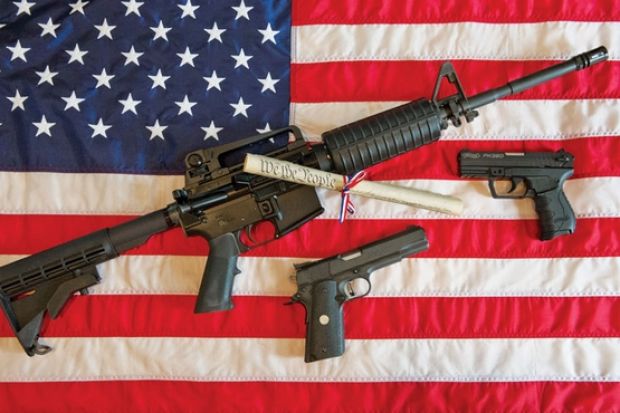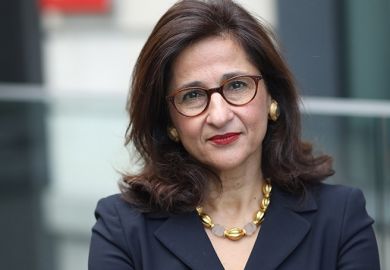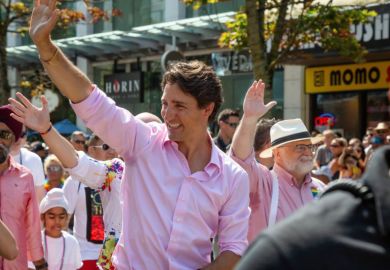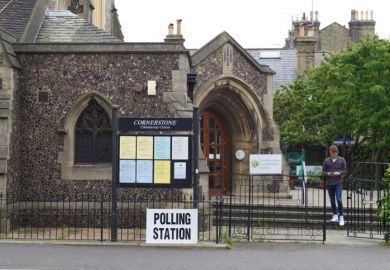Lawrence Schall was particularly moved - as any father of four would be - by the news of the shooting spree that killed 20 children and six adults at Sandy Hook Elementary School in Newtown, Connecticut, in December.
“My kids went to an elementary school that looked exactly like that elementary school,” Schall says. “We have the same kinds of relationships with the teachers that those parents had with those teachers.”
But Schall is not just any father: he is the president of Oglethorpe University in the US state of Georgia, a position that offers a moral and intellectual platform that he decided he could use to push for changes to the nation’s gun laws.
“There was something about this incident where many of us finally said: ‘We have got to do better’,” he says.
Schall and Elizabeth Kiss, president of Agnes Scott College, Oglethorpe’s neighbouring institution, co-wrote a letter calling for a ban on assault weapons and more background checks for gun buyers.
“The time has long since passed for silence and inaction on the issue of reasonable and rational gun safety legislation,” the letter states.
Within four days - lightning speed by academic standards - it had been signed by more than 300 institutional presidents. The list of signatories has since surpassed 400, mostly leaders of private, liberal-arts colleges. They even have a name: College Presidents for Gun Safety.
Another president, Lee Pelton, of Emerson College, Boston, soon established a centre to coordinate events at campuses nationwide that bring attention to gun laws and related issues. And other institutions are hosting speakers on each side of the gun divide, from David Keene, head of lobbying group the National Rifle Association (Harvard University), to US vice-president Joe Biden (Western Connecticut State University, just a few miles from Newtown).
The college presidents’ widespread and sudden activism over an issue so controversial is noteworthy by virtue of the emotions at play in the gun debate. But it is also a rare example of university presidents involving themselves in public policy, something that was once common in the US but has since been beaten down by campus politics and the need to mollify donors, students, parents, alumni, legislators and other interest groups.
Tellingly, few presidents at public universities, beholden as they are to governors and elected legislators for much of their funding, have joined the campaign.
And the Association of American Universities, a body representing some of the largest public and private institutions in the US, has issued a softer, separate statement calling on national leaders “to apply honest and open scrutiny to identifying and implementing meaningful, consequential actions”, but without offering specifics.

We’ve silenced ourselves largely out of fear of offending somebody. Because so much of our job has become about raising money, you’re not going to willingly step up and make statements that run the risk of offending anybody
“We’ve silenced ourselves largely out of fear of offending somebody,” says Schall, who previously worked as a civil-rights attorney. “Because so much of our job has become about raising money, you’re not going to willingly step up and make statements that run the risk of offending anybody.”
It was not always thus. Kingman Brewster, president of Yale University from 1963 to 1977, and others from his generation of higher education leaders spoke out against the Vietnam War. The Reverend Theodore Hesburgh, president of the University of Notre Dame from 1952 to 1987, was an advocate for civil rights and other causes.
But the world today “is entirely different”, says David Warren, president of the National Association of Independent Colleges and Universities. “There was no shared governance then. These were really figures of authority, unchallenged, and they ruled in an authoritarian way. They did not have to contend with social media. Their jobs and their institutions were largely secure.”
Since that era, Warren adds, the presidents have banded together to express themselves on issues such as apartheid, affirmative action and climate change.
“It is less the bold and solitary figure,” he says. “It is much more presidents agreeing on a particular significant public policy question and coming forward.”
Seldom has this involved anything as controversial as guns, however.
“What is the role of a college president in society?” asks Schall. “We’re an important voice. We’re not the only voice. We’re not the most informed voice about everything. But we’re generally more informed.”
They certainly know all too well how gun violence has directly affected university campuses, where 56 people have been killed in mass shootings since, and including, the Virginia Tech massacre in 2007.
Proposed laws in states including Georgia would allow students, academics and other staff to carry guns on campus.
“Our students are at risk by this reaction of ‘put guns in the hands of our faculty and students, and we’ll all feel safer’,” Schall says. “So we do feel threatened on behalf of our students.”

What is the role of a college president in society? We’re an important voice. We’re not the only voice. We’re not the most informed voice about everything. But we’re generally more informed
This is one of the reasons why Pelton says he quickly got involved in the gun debate, presiding over the opening of the College Presidents’ Gun Violence Resource Center, which will report on and support events on campuses across the country that aim to combat gun violence.
“Our campuses have been terribly harmed by firearms,” he says. “This issue felt close to home to many college and university presidents.”
Presidents often work with students not much older than the 20,000 under- 19s who are shot in the US each year, Pelton adds: 2,600 of them die.
“Firearms are killing children and young people, destroying families and victimising survivors at an unacceptably high rate. If you’re black, the statistics are even more startling,” says Pelton.
“It’s an epidemic and it’s a public health issue. What I want to do, on behalf of the university, is to shine a bright light on this issue, to increase awareness.”
There is still a risk in all this, however. For example, not all members of Schall’s board of trustees support his position on guns, he says. And both he and Pelton report receiving plenty of critical emails, Facebook postings and telephone calls.
“It would be foolish of a college president to ignore the importance of being able to speak to a community that tends to be politically diverse,” says Kiss, Schall’s co-author on the gun-control letter. “So this is an unusual instance, and I think for some of the college presidents who signed, it was even more of an act of personal courage than for others.”
Schall says that some presidents have told the group that their governing boards banned them from joining the campaign, and two of the signatories asked to have their names removed after being pressured by trustees.
“It’s partly out of prudence, because you represent an organisation with many, many stakeholders. For some presidents, there was also a sense of: ‘What gives me the authority to speak out?’,” Kiss says.
But, so far, the biggest backlash has been against not the presidents who are speaking out for gun control but the ones who are not. Student activists at universities whose leaders have not joined College Presidents for Gun Safety have taken them to task for it, as have journalists.

Some presidents have told the group that their governing boards banned them from joining the campaign, and two of the signatories asked to have their names removed after being pressured by trustees
“There are times, there are events, that blow up the encyclopedia of excuses,” wrote Arnie Arnesen, columnist at the Providence Journal, who went on to lambast the presidents of Harvard, Yale, Brown, Dartmouth and other universities for not signing the Schall-Kiss letter.
Aside from Schall’s emails, Kiss says that, for her part, she was prompted to get involved by her all-female institution’s short mission statement, that it educates women “to think deeply”, live honourably and “engage the intellectual and social challenges of their times”.
“How do I ask students to live honourably and engage the intellectual and social challenges of their times if I’m not willing to do it?” she asks.
The gun debate has now begun to catalyse a broader movement encouraging university presidents to use what some advocates refer to as their “bully pulpits”, an Americanism first coined by President Theodore Roosevelt that refers to a platform from which one can preach a position.
Roosevelt was talking about the White House but Kiss and others say that university presidents have their own built-in bully pulpits.
“In a society where there are few leadership positions that have not been subject to intense criticism, there’s a certain sense of this being a respected position, both because of the nature of the educational mission - that this is a noble profession to be in - and because individuals who are college presidents are people who have achieved some level of the respect of their peers,” she says. “There’s a sense that this is a role one ought to carry with…conscience and dignity.”
A recent NAICU conference in Washington, of higher education administrators, included a panel called “Building the Bully Pulpit”, which attracted around 250 delegates.
“It’s time for college presidents to stand up and take positions,” says Scott Miller, president of Bethany College and one of the speakers on the panel.
Miller says that university presidents have the power that comes from the fact that their calls are returned by senators and congressmen. They also have access to another important resource, he says: voters and the people they vote for.
“The future leaders of America are on our campuses,” Miller says.

The biggest backlash has been against not the presidents speaking out for gun control but the ones who are not: student activists at universities whose leaders have not joined College Presidents for Gun Safety have taken them to task about it
As for criticism? It is part of the job: “As a result of the 24/7, 365-day news cycle, where every word [one] speaks can be out on the internet in a matter of seconds, presidents have been a little shy about getting out there on some topics,” he says.
“But that is all part of bringing it to the table and starting a conversation.”
The bigger question is whether the presidents will now speak out on other issues.
Miller hopes that the gun-control campaign will inspire other leaders to do similar things in other areas.
Kiss is optimistic, too.
“While we need to be judicious about when we speak, nevertheless there are these moments of conscience when you have to speak out,” she says - especially today, when “we desperately need people to inject nuance and respect for the evidence into public debate. That’s not to say that college presidents will automatically do that but one would hope they will.
“I don’t envision that college presidents are going to start to comment on free trade and tariffs or whatever. But on issues, including controversial ones, where there is some link either to the importance of evidence and data or to the well-being or the opportunities that we should be providing to young people, I do hope there will be a greater willingness to stand up and speak out.”
Kiss adds: “This may be a cultural shift.”
Pelton sees not just an opportunity but also an imperative for university presidents to speak out about issues such as immigration and the high incarceration rates affecting young non-whites.
“The nation looks to colleges and universities to solve its most pressing problems, and we do that through research and teaching,” he says. “But we also have an obligation to be engaged citizens - willing to engage our own communities and the nation in a good conversation, even adopt advocacy positions on important topics.”
Pelton concludes: “I think we’re actually obliged to do that.”
Register to continue
Why register?
- Registration is free and only takes a moment
- Once registered, you can read 3 articles a month
- Sign up for our newsletter
Subscribe
Or subscribe for unlimited access to:
- Unlimited access to news, views, insights & reviews
- Digital editions
- Digital access to THE’s university and college rankings analysis
Already registered or a current subscriber? Login




